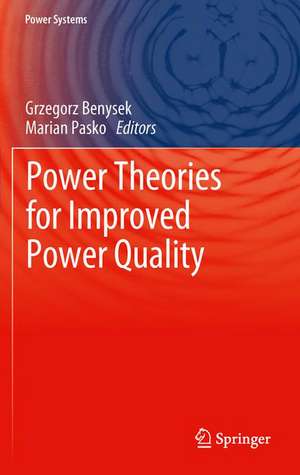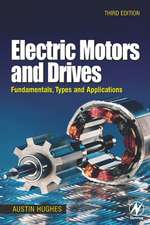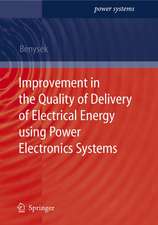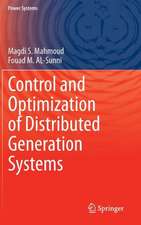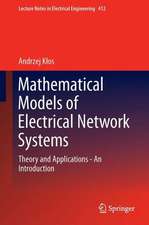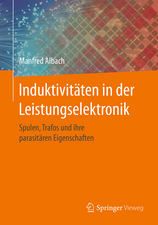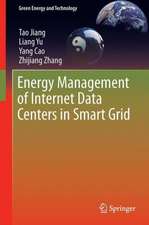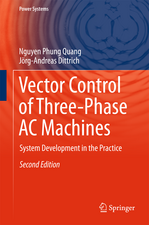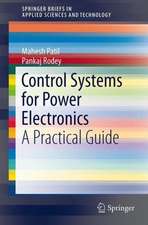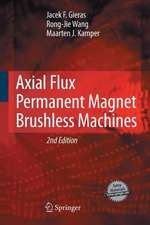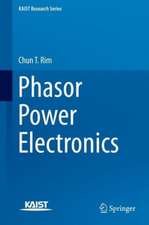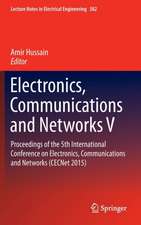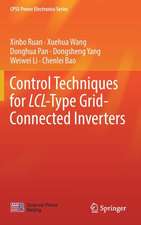Power Theories for Improved Power Quality: Power Systems, cartea 1
Editat de Grzegorz Benysek, Marian Paskoen Limba Engleză Paperback – 13 apr 2014
Focusing particularly on active compensators and the DSP based control algorithms, Power Theories for Improved Power Quality introduces the fundamental problems of electrical power. This introduction is followed by chapters which discuss:
‘Power theories’ including their historical development and application to practical problems,
operational principles of active compensator’s DSP control based algorithms using examples and results from laboratory research, and
the key areas of application for these methods and suggested practical solutions.
Power Theories for Improved Power Quality is a key study resource for students in engineering and technical degrees as well as a reference for professional and practitioners in the electrical energy sector working with power quality.
| Toate formatele și edițiile | Preț | Express |
|---|---|---|
| Paperback (1) | 941.05 lei 6-8 săpt. | |
| SPRINGER LONDON – 13 apr 2014 | 941.05 lei 6-8 săpt. | |
| Hardback (1) | 947.04 lei 6-8 săpt. | |
| SPRINGER LONDON – 26 feb 2012 | 947.04 lei 6-8 săpt. |
Din seria Power Systems
- 18%
 Preț: 953.13 lei
Preț: 953.13 lei - 18%
 Preț: 783.98 lei
Preț: 783.98 lei - 20%
 Preț: 1002.48 lei
Preț: 1002.48 lei - 18%
 Preț: 1021.86 lei
Preț: 1021.86 lei - 18%
 Preț: 897.65 lei
Preț: 897.65 lei - 18%
 Preț: 788.72 lei
Preț: 788.72 lei - 18%
 Preț: 734.27 lei
Preț: 734.27 lei - 18%
 Preț: 902.36 lei
Preț: 902.36 lei -
 Preț: 563.51 lei
Preț: 563.51 lei - 18%
 Preț: 955.08 lei
Preț: 955.08 lei - 18%
 Preț: 946.87 lei
Preț: 946.87 lei - 18%
 Preț: 950.52 lei
Preț: 950.52 lei - 18%
 Preț: 949.23 lei
Preț: 949.23 lei - 15%
 Preț: 641.85 lei
Preț: 641.85 lei - 18%
 Preț: 1116.26 lei
Preț: 1116.26 lei - 18%
 Preț: 961.10 lei
Preț: 961.10 lei - 18%
 Preț: 1380.78 lei
Preț: 1380.78 lei - 15%
 Preț: 639.59 lei
Preț: 639.59 lei - 15%
 Preț: 641.03 lei
Preț: 641.03 lei - 18%
 Preț: 2497.51 lei
Preț: 2497.51 lei - 18%
 Preț: 957.62 lei
Preț: 957.62 lei - 18%
 Preț: 1229.91 lei
Preț: 1229.91 lei - 15%
 Preț: 643.34 lei
Preț: 643.34 lei - 18%
 Preț: 957.09 lei
Preț: 957.09 lei - 18%
 Preț: 1231.47 lei
Preț: 1231.47 lei - 15%
 Preț: 698.30 lei
Preț: 698.30 lei - 18%
 Preț: 953.20 lei
Preț: 953.20 lei - 15%
 Preț: 640.88 lei
Preț: 640.88 lei - 15%
 Preț: 634.18 lei
Preț: 634.18 lei - 18%
 Preț: 955.08 lei
Preț: 955.08 lei - 18%
 Preț: 1241.73 lei
Preț: 1241.73 lei - 18%
 Preț: 952.09 lei
Preț: 952.09 lei - 18%
 Preț: 946.55 lei
Preț: 946.55 lei - 18%
 Preț: 961.86 lei
Preț: 961.86 lei - 18%
 Preț: 944.19 lei
Preț: 944.19 lei - 18%
 Preț: 1110.72 lei
Preț: 1110.72 lei - 15%
 Preț: 642.03 lei
Preț: 642.03 lei - 15%
 Preț: 636.12 lei
Preț: 636.12 lei - 18%
 Preț: 1054.99 lei
Preț: 1054.99 lei - 15%
 Preț: 639.90 lei
Preț: 639.90 lei - 18%
 Preț: 957.32 lei
Preț: 957.32 lei - 18%
 Preț: 1235.57 lei
Preț: 1235.57 lei - 18%
 Preț: 959.19 lei
Preț: 959.19 lei
Preț: 941.05 lei
Preț vechi: 1147.63 lei
-18% Nou
Puncte Express: 1412
Preț estimativ în valută:
180.09€ • 187.33$ • 148.68£
180.09€ • 187.33$ • 148.68£
Carte tipărită la comandă
Livrare economică 14-28 aprilie
Preluare comenzi: 021 569.72.76
Specificații
ISBN-13: 9781447160625
ISBN-10: 1447160622
Pagini: 224
Ilustrații: X, 214 p.
Dimensiuni: 155 x 235 x 12 mm
Greutate: 0.32 kg
Ediția:2012
Editura: SPRINGER LONDON
Colecția Springer
Seria Power Systems
Locul publicării:London, United Kingdom
ISBN-10: 1447160622
Pagini: 224
Ilustrații: X, 214 p.
Dimensiuni: 155 x 235 x 12 mm
Greutate: 0.32 kg
Ediția:2012
Editura: SPRINGER LONDON
Colecția Springer
Seria Power Systems
Locul publicării:London, United Kingdom
Public țintă
ResearchCuprins
Principles of Electrical Power Control.- Active Power Quality Compensators.- Realization of Digital Control Algorithm.- Power Theories Applications to Control Active Compensators.- Practical Applications of Active Compensators.
Notă biografică
Professor Marian Pasko obtained his D.SC. degree in 1994 from the Faculty of Electrical Engineering at the Silesian University of Technology, defending a thesis titled: “Selection of compensators to optimize the working conditions of one-phase and multi-phase voltage sources with periodical non-sinusoidal waveforms“. The primary areas of his research are issues related to improving the power quality of electric systems operating in conditions of deformation of voltages and currents. His most important achievements include:
optimization of working conditions of the non-sinusoidal periodic real voltage source by means of LC one-ports;
application of LC one-ports in phase load symmetrization in n-phase systems with non-sinusoidal periodical waveforms; and
design of LC compensator synthesis algorithm. Dr Grzegorz
Benysek obtained his PhD degree in 1998 from the Electrical Engineering Department at the Technical University of Zielona Góra, defending a thesis titled: "An analysis of hybrid compensator systems for the filtration harmonic current in AC supply networks". On November 16th 2007 he obtained his D.SC. degree from the Faculty of Electrical Engineering, Computer Science and Telecommunications at the University of Zielona Góra, defending a thesis titled: "Improvement in the Quality of Delivery of Electrical Energy using Power Electronics Systems". From the beginning he was involved in two major research areas:
1. utilization of the FACTS in distributed electric power systems;
2. power electronics based arrangements for power quality improvement.
His most important achievements include:
design, development and experimental investigations of different types of the active power conditioners (filtration-compensation arrangements and FACTS, also on the base of multilevel-inverters);
completion of theoretical and experimental studies of considered active power conditioners whichallowed the most advantageous selection from the point of view of implementation;
the universal control algorithm for active power conditioners assigned to both the symmetrical and non-symmetrical loads; and
elaboration of probabilistic based methodology for active power conditioners power rating selection in distributed electric power systems.
He also worked vigorously to inaugurate international cooperation with universities across Europe. The collaborations resulted in two research projects granted by the European Union, among others.
optimization of working conditions of the non-sinusoidal periodic real voltage source by means of LC one-ports;
application of LC one-ports in phase load symmetrization in n-phase systems with non-sinusoidal periodical waveforms; and
design of LC compensator synthesis algorithm. Dr Grzegorz
Benysek obtained his PhD degree in 1998 from the Electrical Engineering Department at the Technical University of Zielona Góra, defending a thesis titled: "An analysis of hybrid compensator systems for the filtration harmonic current in AC supply networks". On November 16th 2007 he obtained his D.SC. degree from the Faculty of Electrical Engineering, Computer Science and Telecommunications at the University of Zielona Góra, defending a thesis titled: "Improvement in the Quality of Delivery of Electrical Energy using Power Electronics Systems". From the beginning he was involved in two major research areas:
1. utilization of the FACTS in distributed electric power systems;
2. power electronics based arrangements for power quality improvement.
His most important achievements include:
design, development and experimental investigations of different types of the active power conditioners (filtration-compensation arrangements and FACTS, also on the base of multilevel-inverters);
completion of theoretical and experimental studies of considered active power conditioners whichallowed the most advantageous selection from the point of view of implementation;
the universal control algorithm for active power conditioners assigned to both the symmetrical and non-symmetrical loads; and
elaboration of probabilistic based methodology for active power conditioners power rating selection in distributed electric power systems.
He also worked vigorously to inaugurate international cooperation with universities across Europe. The collaborations resulted in two research projects granted by the European Union, among others.
Textul de pe ultima copertă
Power quality describes a set of parameters of electric power and the load’s ability to function properly under specific conditions. It is estimated that problems relating to power quality costs the European industry hundreds of billions of Euros annually. In contrast, financing for the prevention of these problems amount to fragments of these costs. Power Theories for Improved Power Quality addresses this imbalance by presenting and assessing a range of methods and problems related to improving the quality of electric power supply.
Focusing particularly on active compensators and the DSP based control algorithms, Power Theories for Improved Power Quality introduces the fundamental problems of electrical power. This introduction is followed by chapters which discuss:
•‘Power theories’ including their historical development and application to practical problems,
•operational principles of active compensator’s DSP control based algorithms using examples and results from laboratory research, and
•the key areas of application for these methods and suggested practical solutions.
Power Theories for Improved Power Quality is a key study resource for students in engineering and technical degrees as well as a reference for professional and practitioners in the electrical energy sector working with power quality.
Focusing particularly on active compensators and the DSP based control algorithms, Power Theories for Improved Power Quality introduces the fundamental problems of electrical power. This introduction is followed by chapters which discuss:
•‘Power theories’ including their historical development and application to practical problems,
•operational principles of active compensator’s DSP control based algorithms using examples and results from laboratory research, and
•the key areas of application for these methods and suggested practical solutions.
Power Theories for Improved Power Quality is a key study resource for students in engineering and technical degrees as well as a reference for professional and practitioners in the electrical energy sector working with power quality.
Caracteristici
Presents issues related to methods of improving power quality Focuses on the use of active compensators Illustrates theoretical considerations with results from laboratory research Includes supplementary material: sn.pub/extras
